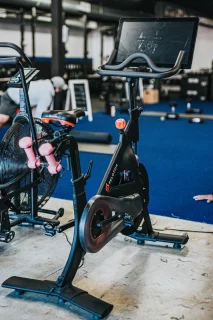 Peloton has come out on top of the litigation leaderboard yet again. As we previously blogged about here, Peloton is no stranger to trade secret litigation. Peloton recently won dismissal of a “mirror image” declaratory judgment counterclaim asserted against it by rival ICON Health (“ICON”) in a Defend Trade Secrets Act (“DTSA”) matter pending in the United States District Court for the District of Delaware.
Peloton has come out on top of the litigation leaderboard yet again. As we previously blogged about here, Peloton is no stranger to trade secret litigation. Peloton recently won dismissal of a “mirror image” declaratory judgment counterclaim asserted against it by rival ICON Health (“ICON”) in a Defend Trade Secrets Act (“DTSA”) matter pending in the United States District Court for the District of Delaware.
Continue Reading Mirroring Peloton Won’t Result in Victory
Anne Dunne
Seyfarth Shaw Attorneys Contribute to ABA’s Annual Trade Secret Law Report
 Seyfarth attorneys Kate Perrelli, Sierra Chinn-Liu, Anne Dunne, Joshua Salinas, and Paul Yovanic contributed to this year’s ABA Section of Intellectual Property Law, Trade Secrets and Interferences with Contracts Committee Annual Trade Secret Law Report.
Seyfarth attorneys Kate Perrelli, Sierra Chinn-Liu, Anne Dunne, Joshua Salinas, and Paul Yovanic contributed to this year’s ABA Section of Intellectual Property Law, Trade Secrets and Interferences with Contracts Committee Annual Trade Secret Law Report.
The Annual Report, found here, covers the significant trade secrets cases from around the country that were decided in 2019 and 2020. The…
Continue Reading Seyfarth Shaw Attorneys Contribute to ABA’s Annual Trade Secret Law Report
The Silver State Grips the Blue Pencil

As we have previously blogged about, in 2016 the Nevada Supreme Court refused to adopt the “blue pencil” doctrine and held that Nevada courts could not modify over-broad restrictive covenants. The following year, we alerted readers that the Nevada legislature amended Nevada Revised Statute 613, governing non-competition agreements. Among other things, the amendment granted courts the authority to “blue-pencil” non-competition agreements, overturning the Nevada Supreme Court’s 2016 decision in Golden Road Motor Inn, Inc. v. Islam.
Continue Reading The Silver State Grips the Blue Pencil
Massachusetts Superior Court Axes an Attempt to Expand the Scope of the Seminal Non-Compete Law Concerning Material Change in Employment
 The Massachusetts Superior Court recently held in Now Business Intelligence, Inc. v. Donahue that a temporary reassignment during a business slowdown, consisting of the addition of certain non-billable duties, does not constitute a material change invalidating a non-compete agreement. The dispute centered on Now Business Intelligence, Inc.’s (“NBI”) ability to hold its former employee, Sean Donahue (“Donahue”), liable for breach of his covenant not to compete.
The Massachusetts Superior Court recently held in Now Business Intelligence, Inc. v. Donahue that a temporary reassignment during a business slowdown, consisting of the addition of certain non-billable duties, does not constitute a material change invalidating a non-compete agreement. The dispute centered on Now Business Intelligence, Inc.’s (“NBI”) ability to hold its former employee, Sean Donahue (“Donahue”), liable for breach of his covenant not to compete.
Continue Reading Massachusetts Superior Court Axes an Attempt to Expand the Scope of the Seminal Non-Compete Law Concerning Material Change in Employment
Erik Weibust, Alison Eggers, and Anne Dunne Published in Retail and Food Best Practices
 Seyfarth attorneys Erik Weibust, Alison Eggers, and Anne Dunne recently published an article entitled “Why It’s Important to Bake Restrictive Covenants into Food and Beverage Industry Agreements” in Retail & Food Best Practices, an industry publication for the retail and food industry.
Seyfarth attorneys Erik Weibust, Alison Eggers, and Anne Dunne recently published an article entitled “Why It’s Important to Bake Restrictive Covenants into Food and Beverage Industry Agreements” in Retail & Food Best Practices, an industry publication for the retail and food industry.
Recipes, ingredients, formulas, and processes are sometimes kept secret for generations in the food and…
Continue Reading Erik Weibust, Alison Eggers, and Anne Dunne Published in Retail and Food Best Practices
The First Circuit Weighs in on the Applicability of Massachusetts’ Non-Compete Law
 Late last spring we reported on the second published decision out of the District of Massachusetts citing the Massachusetts Noncompetition Agreement Act (“MNCA”), NuVasive, Inc. v. Day. On April 8, 2020, the First Circuit issued a decision on the defendant’s appeal, upholding the lower court’s ruling. While the First Circuit’s decision does not directly analyze an agreement that is subject to the MNCA, it is still instructive for out-of-state employers with personnel who may be subject to that law.
Late last spring we reported on the second published decision out of the District of Massachusetts citing the Massachusetts Noncompetition Agreement Act (“MNCA”), NuVasive, Inc. v. Day. On April 8, 2020, the First Circuit issued a decision on the defendant’s appeal, upholding the lower court’s ruling. While the First Circuit’s decision does not directly analyze an agreement that is subject to the MNCA, it is still instructive for out-of-state employers with personnel who may be subject to that law.
Continue Reading The First Circuit Weighs in on the Applicability of Massachusetts’ Non-Compete Law
Peloton Surges to the Top of the Leaderboard in Competitor Spat
 In 2012, Peloton rode into the home fitness scene with its now ubiquitous at-home exercise bike, which features a tablet that allows riders to stream both live and pre-recorded classes while competing against other riders on a virtual leaderboard. Peloton built the bike, including the associated technology and software, from scratch, and applied for and obtained a number of patents between 2015 and 2019 to protect its sizable investment of both time and money.
In 2012, Peloton rode into the home fitness scene with its now ubiquitous at-home exercise bike, which features a tablet that allows riders to stream both live and pre-recorded classes while competing against other riders on a virtual leaderboard. Peloton built the bike, including the associated technology and software, from scratch, and applied for and obtained a number of patents between 2015 and 2019 to protect its sizable investment of both time and money.
In 2017, Flywheel, a boutique exercise studio, pedaled into the home fitness scene as well with the FLY Anywhere bike. Like Peloton users, FLY Anywhere riders stream both live and pre-recorded classes while pedaling their way up the leaderboard.
Continue Reading Peloton Surges to the Top of the Leaderboard in Competitor Spat
Massachusetts’ High Court Pumps the Brakes on Equitable Tolling of Restrictive Covenant
 For the first time in 15 years, the Supreme Judicial Court (“SJC”), Massachusetts’ highest court, issued a decision analyzing the enforceability of non-solicitation covenants, the distinction between such covenants in the context of the sale of a business versus employment, and equitable tolling of restrictive covenants. As set forth below, this decision serves as an important reminder to businesses who impose restrictive covenants governed by Massachusetts law.
For the first time in 15 years, the Supreme Judicial Court (“SJC”), Massachusetts’ highest court, issued a decision analyzing the enforceability of non-solicitation covenants, the distinction between such covenants in the context of the sale of a business versus employment, and equitable tolling of restrictive covenants. As set forth below, this decision serves as an important reminder to businesses who impose restrictive covenants governed by Massachusetts law.
Factual Background
While the factual background of the case is long and twisty, only a few key details are necessary to rehash here. The defendant Matthew McGovern (“McGovern”) entered into a restrictive covenants agreement with his former co-shareholders of the Prime Motor Group (“Prime”), in exchange for plaintiffs’ agreement to buy out McGovern’s minority share in Prime with no discount. The agreement, which was made a year after McGovern had been terminated as an employee and as part of a resolution of the parties’ dispute concerning McGovern’s alleged violation of an earlier restrictive covenants agreement, prohibited McGovern from hiring, soliciting, or encouraging Prime employees to leave Prime for 18 months. The agreement contained no tolling provision, but provided that plaintiffs would be entitled to injunctive relief if McGovern breached, without needing to prove irreparable harm.
Continue Reading Massachusetts’ High Court Pumps the Brakes on Equitable Tolling of Restrictive Covenant
Fettucine Al Fraudo—New York Pizzaiolo in Hot Water After Alleged Theft of Secret Pasta Recipe
 Manhattan restaurant Sottolio, Inc., d/b/a Norma Gastronomia Siciliana hired Giuseppe Manco—“a noted Italian pizza chef, or pizzaiolo”—to consult on its menu. At the same time, Manco and his wife purchased a 9% interest in the restaurant, becoming co-owners of the business. Manco signed a non-compete and non-disclosure agreement in connection with his hiring, under which Manco agreed, for ten years, to not replicate, copy, or duplicate Plaintiff’s confidential information, including its “signature recipes” for arancine, pasta alla norma, caponata, anelletti al forno, and carbonara di mare, or to use the signature recipes within a ten mile radius of Sottolio’s Manhattan restaurant.
Manhattan restaurant Sottolio, Inc., d/b/a Norma Gastronomia Siciliana hired Giuseppe Manco—“a noted Italian pizza chef, or pizzaiolo”—to consult on its menu. At the same time, Manco and his wife purchased a 9% interest in the restaurant, becoming co-owners of the business. Manco signed a non-compete and non-disclosure agreement in connection with his hiring, under which Manco agreed, for ten years, to not replicate, copy, or duplicate Plaintiff’s confidential information, including its “signature recipes” for arancine, pasta alla norma, caponata, anelletti al forno, and carbonara di mare, or to use the signature recipes within a ten mile radius of Sottolio’s Manhattan restaurant.
Continue Reading Fettucine Al Fraudo—New York Pizzaiolo in Hot Water After Alleged Theft of Secret Pasta Recipe
Another Year, Another Attempt in the U.S. Senate to Ban Non-Competes Nationwide
 Senators Chris Murphy (D-Conn.) and Todd Young (R-Ind.) have introduced legislation entitled the Workforce Mobility Act (“WMA”). The WMA, like its prior incarnation from last year, seeks to ban non-compete agreements outside of the sale of a business or dissolution of a partnership. The WMA also follows a similar, unsuccessful, attempt by the federal government to limit non-compete agreements on a national scale earlier this year.
Senators Chris Murphy (D-Conn.) and Todd Young (R-Ind.) have introduced legislation entitled the Workforce Mobility Act (“WMA”). The WMA, like its prior incarnation from last year, seeks to ban non-compete agreements outside of the sale of a business or dissolution of a partnership. The WMA also follows a similar, unsuccessful, attempt by the federal government to limit non-compete agreements on a national scale earlier this year.
Continue Reading Another Year, Another Attempt in the U.S. Senate to Ban Non-Competes Nationwide